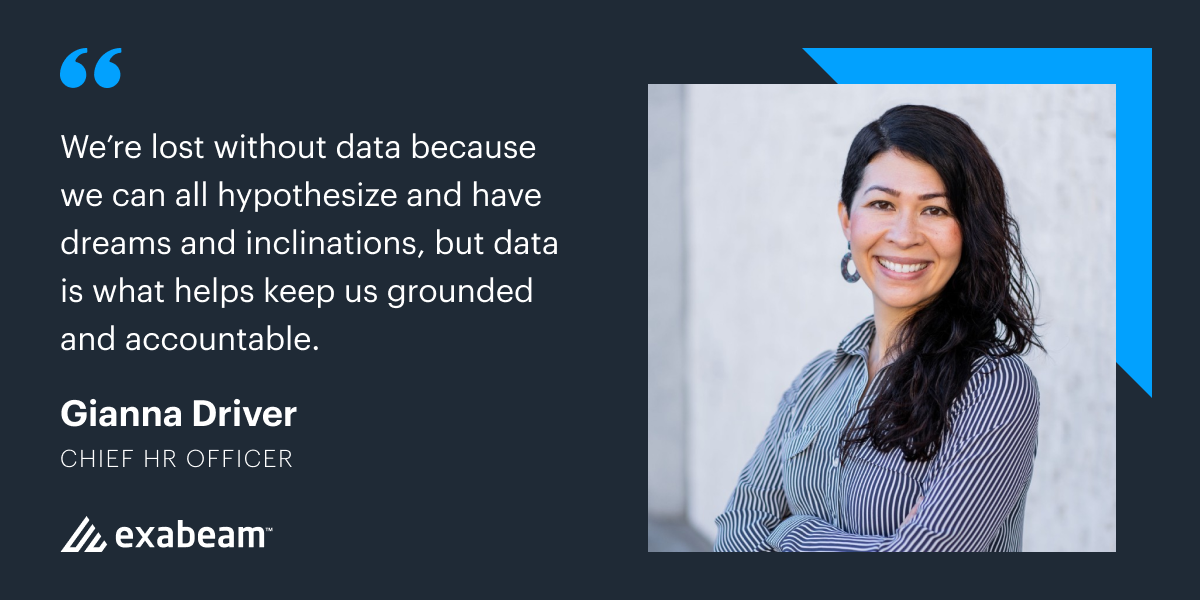Over the last 20 years, Gianna Driver has led human resources at companies of all sizes. Most recently, she joined Exabeam, a late-stage cybersecurity company that has raised over $390M in funding at a valuation of more than $2 billion. We sat down with Gianna to learn how she thinks about compensation planning for startups.

Tactics for startup HR leaders to consider:
-
“Who do we want to be when we grow up?” as a compensation question
-
Starting early with a general framework, then getting more detailed
-
Using compa-ratios as you implement your philosophy
-
Asking potential hires about equity early on
What should startups be thinking about when it comes to compensation?
I’m passionate about being part of organizations that really care about inclusivity, equal treatment for employees, and rewarding standout work from amazing folks. I help bring structure and frameworks to organizations because these are lofty goals and wonderful things to espouse—but the actual implementation of them is where the rubber hits the road.
Implementing a compensation philosophy and compensation plan that truly reflects your values is work. People like to say “We can move mountains,” but when you’re in the process of moving a mountain, it’s really not glamorous. You have a wheelbarrow and a shovel full of dirt you’re moving from here to there. It’s only when you step back and see the full picture that you can say, “Wow. That’s a mountain we moved! Or said another way, ‘That’s an amazing compensation philosophy that we’ve put into practice!’”
What does that process look like—the part where, to continue the metaphor, you’re pushing the wheelbarrow? What is that nitty-gritty? What are the tough conversations that startups maybe don’t think about or don’t want to think about, but really they should be focused on?
Typically at small, really scrappy organizations, founders aren’t thinking much about long-term compensation planning because there are so many other issues they’re trying to tackle and solve. But then, there’s an inflection point where I think leaders start to realize, “OK. We need to get really intentional about crafting a specific total rewards strategy and a compensation strategy.”
And usually there’s a conversation that needs to happen around: “What do we care about? Do we want to be an organization that is paying a lot in cash or that is more heavily indexed toward equity? What kinds of benefits do we want to have? How do we want to compare to our peers? Do we want to be like the Netflixes of the world, where we have absolutely incredible benefits and we pay at P-75 (meaning, we’re paying better than three-quarters of the competition for that role at that level)? Can we afford to do that?”
There is a pivotal time to have conversations with leaders—namely the CEO, and often the board, too—to discuss: Who do we want to be when we grow up?
What are the sort of tactical decisions that might stem from those conversations?
As an example, part of this conversation might discuss: What types of talent are critical to our success? Of course, all talent is important, but at different stages in an organization’s life cycle and journey, different job families may be more critical than others.
A decision that comes out of this discussion might be: “We’re going to bifurcate our compensation philosophy. We want to be at P-60 for tech roles and engineering, but for sales and marketing, we’ll be at P-50, meaning we’re at market midpoint.” There’s no right or wrong decision, but coming up with that framework helps organizations ground their practice so they know why they’re making decisions.
Earlier on, in the absence of any framework, sometimes creating something for everyone and saying “we’ll be at P-50 or P-60 across the board,” is a good way to get up and running. Then over time, you can become more nuanced and specific, because it does take time and energy to create more complicated frameworks for each type of role.
Good point. Because if companies have no plan at all, they might end up with a fair amount of organizational debt when setting out to make a plan later.
What often happens when a company goes from having nothing to having a defined compensation philosophy is that they have to tackle applying that philosophy to incumbent employees. As you do that, typically what you’ll find is there are the overs, whose compensation is above the band you’ve created for the role, and there are the unders.
I like to look at compa-ratios, short for comparison ratios, which divide the salary number by the midpoint for the salary band. That means if market is 1.0, a compa of less than 0.85 is “under band” and worth looking into. Organizations will usually apply the compensation philosophy, and then there’s usually an analysis to say, “OK. If we wanted to get everyone to our compensation philosophy, it’s going to cost this much cash and this much equity.” And then there’s a whole other workstream to make that happen.
Interesting, so it seems like although a compensation philosophy may sound like a broad or abstract idea, there ends up being a lot of hard numbers that can measure the application of these principles?
Exactly, and that’s why data is key. We’re lost without data because we can all hypothesize and have dreams and inclinations, but data is what helps keep us grounded and accountable. I advise founders and leaders to look at a plethora of data. Your current employee data is a starting point, but then it’s also important to look at benchmarking data, so you can objectively say how you’re doing relative to your peers.
What advice do you have for a startup competing for talent?
Generally speaking, smaller organizations are more cash-strapped. They might not yet be profitable. So generally those organizations can’t afford to pay cash at P-75, that Netflix model of compensation.
Equity is the currency that startups and smaller companies have. I’ve found this can be a bit of a litmus test for attracting talent as you build an organization and culture. If you’re a small or rapidly growing organization, folks who care primarily about cash are, frankly, not a good fit for your company. But it varies for each candidate, so it’s a good baseline for entering those early conversations with potential hires. I usually will ask them, “What do you value more? Are you looking to optimize for cash or optimize for equity?” Knowing that, of course, people want to optimize for both and have lots of both!
I was talking to a candidate the other day whose last company had gone public and they’d made—not never-have-to-work-again money, but a significant amount of cash. The salary still mattered to them, but quite frankly, the cash wasn’t that important. That candidate cared more about equity, because they wanted that same experience again. In those situations, the conversation becomes about their equity compensation: what it will be and how it might grow.
And that’s really something to think about, because when you look at true wealth creation in America, generally it’s not because someone’s base pay is really high or their bonus pay is high. “Big Wealth,” like significant wealth, often comes from equity.
———
Compensation planning with Carta Total Comp
Carta Total Comp uses real-time data from more than 120,000 employees, built on the foundation of Carta’s 25,000+ cap table startups to help you implement and manage your company’s values with the most complete salary and equity benchmarks. Schedule a walkthrough to see how you can build a plan today. Or learn more about compensation philosophy and creating a compensation plan on the Carta blog.

